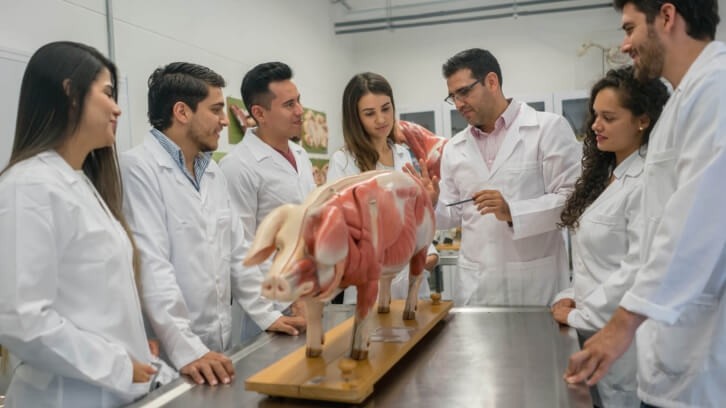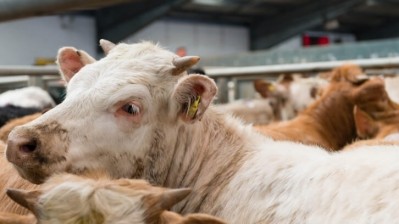Long read
Solving the UK vet shortage

Whether you voted to remain or leave, Brexit has undoubtedly had a huge impact on the UK’s veterinary workforce.
The role of a vet in food production is vast and key to animal wellbeing and consumer safety. In abattoirs they are responsible for checking the health and welfare of the animals when they arrive and go into the lairage, and for conducting checks post-mortem.
Further to this, a public health veterinary will also undertake export health certification work. This has been in place for years with other countries, but it’s only since the UK’s exit from the EU that those areas require certification from Britain. This applies to most products of animal origin and is a mark of safety - without this, such a commodity will not be accepted in the importing market.
“That’s an incredibly important piece of work,” said Charles Hartwell, CEO of Eville & Jones, veterinary - the largest provider of public health vets in the UK. “Because it facilitates around £15bn worth of international trade each year. Without vets doing that job, products can’t be exported. From cheese and ice cream to frozen lasagnes and legs of lamb – the whole shebang!”
Safety checks are also conducted the other way around (exported from countries outside of the UK), with vets ensuring food arrives free of disease, looking at the conditions of which the product is packed and so on. Although it’s worth noting that the UK is still waiting on Government to roll-out veterinary physical checks for products of animal origin arriving from the EU.
Overall, they play a vital function in ensuring that the conditions and process of slaughter is done by the book and the product is safe to enter the food chain...but why do we need an official veterinary (OV) for this?
Why do we need an official veterinary in food production and supply?
Whereas many people will envision a vet as someone who treats their poorly dog or provides worming tablets for their cat in the local surgery, veterinary public health extends far beyond that.
Explaining the importance OVs play, Hartwell commented: “Raw, frozen, processed meat can all contain disease – and a veterinary surgeon through their years of training is there to identify whether any is present.
“It’s internationally recognised through the European Union and various other countries that a veterinary surgeon is the most qualified to identify and control the spread of disease in products of animal origin.”
The great vet shortage
However, the UK’s veterinary workforce is facing a severe shortage as a result of legislative change brought about by Brexit which has essentially cut off (or at least made it very difficult) our access to EU vets, upon which we’re very reliant.
To put this into context, data from the Royal College of Veterinary Surgeons (RCVS) in 2021 revealed that 29% of the total existing UK workforce graduated in the EU, with 2019 numbers showing almost half of new registrants graduated from there.
“One of the issues that this country has is that its demand for vets as a country far exceeds the ability of this country to produce vets,” explained Hartwell. “Before Brexit, we were seeing the need for about 2,000 new vets every year to be registered as veterinary surgeons and the UK vet school system could only produce about 1,000 of them - therefore there's a gap of 1,000.

“So this gap was primarily filled by vets with European Union passports through mutual recognition before Brexit. That was in place for decades and therefore, the UK didn't really need to invest in building more supply capacity i.e. more places at vet schools and more vet schools. That all finished abruptly on the 1st of January 2021.”
Since Brexit, a report from the British Veterinary Association (BVA) says there’s been a dramatic drop in new EU registrants coming to work in the UK, falling by more than two-thirds.
As Hartwell explained, this is because the changes have made entering the UK veterinary work a lot more painful: “Post-Brexit, any [non-UK] vet that wants to come and work in this country now needs a visa, unless they have pre-settled status. These visas can take months to process. On top of that they also have to sit an English language test to secure the visa.”
Before 1 January 2021, Hartwell explained there were no English assessments at all for EU vets to sit. Since 1 January 2021, there are two, which he described as “a massive hurdle put in overnight”.
He continued: “First, the skilled worker visa requires an English score of 4.2, but the RCVS require 7 in order for the vet to register to practice in the UK. RCVS have made some temporary concessions for vets working as OVs in UK abattoirs, but these are due to end in 2024.
“Pre-Brexit, as long as the vet had a degree from a recognised school, as long as the employer considered their English language to be sufficient, they could work here,” he added. “It's a lot easier to go somewhere else in Europe than come to the UK now.”
Professor Matt Jones, head of Harper & Keele Veterinary School agreed: “Historically, veterinary public health roles such as in meat hygiene work have been filled by vet graduates from non-UK EU countries where there is often a greater emphasis on this type of work and fewer opportunities for those working in clinical practice. Brexit has made it difficult to hire EU vets, and language challenges and immigration difficulties limit the ability for those from non-EU countries.”
These figures sit uncomfortably against separate statistics which suggests the demand for certification for export to the EU has rocketed following new post-Brexit requirements.
Data from the UK’s Animal and Plant Health Agency (APHA) shows that applications for food-related export health certificates (products of animal origin and livestock) flew up by 1255% between 2020 and the end of 2021.
However, the BVA believes that the picture could be even worse, as the data excludes orders of equine and pet certificates, germplasm and movements to Northern Ireland, as well as cases when multiple certificates are included in one request.
James Russell, BVA senior vice president, said: “The nosedive in EU registrants since Brexit coupled with soaring demand for veterinary certification is creating a storm of shortages in the profession. It’s absolutely critical that vets get as much support as possible to keep on top of workloads and navigate continued challenges ahead.
“The potential consequences are worrying. If we can’t find long-term solutions to veterinary workforce shortages, we will see impacts on animal welfare, public health and international trade.”
Why aren’t UK vets interested in food production?
According to Hartwell, one of the biggest drivers for a lack OVs in the UK is our culture and awareness of the role.
“People aren’t aware of that vets go into abattoirs, so when they’re considering going to vet school and deciding upon modules, it isn’t even on their radar,” he said.
“An OV safeguards the welfare of about 1.2bn animals a year. They safeguard the health of around 60m consumers a year and help facilitate £15bn worth of international trade. It's an incredibly important role to society, the economy and the environment. It seems to be a role that is not promoted within the whole education system and there's just a massive lack of public awareness.”

Outside of the UK, vet schools will often commit up to a year of a five-year boundary degree to the studies of veterinary public health, compared to the two-weeks some British schools dedicate.
“The whole cultural mindset is that in many European countries, it's a really valid, honourable and prestigious career. This just isn’t the case in the UK,” added Hartwell.
But there are lots of options for vets; they can choose to specialise in certain aspects of production such as pigs, poultry and aquaculture, and many larger food businesses will employ their own vets.
“These can be very stimulating clinical practice-based careers, where vets play a close business advisory type role to help maximise productivity in a welfare-compliant manner. There are also pathways in food safety, in Government roles directly with DEFRA, and with agencies such as the Food Standards Agency and Food Standards Scotland,” explained Jones.
An undesirable workplace?
While we struggle to engage Brits to study veterinary public health in the first place, it also appears that there is a big retention problem for those that do decide to embark on a veterinary career.
“A large number of vets leave the profession within four or five years of qualifying,” informed Hartwell, which can be attributed to stress, burnout and a lack of progression.
As highlighted in a recent BVA workforce report, 21% of those surveyed said they felt unable to cope with the stress, while 63% said they were working too hard, and 48% expressed that they were burnt out. Moreover, up to 37% of respondents reported actively thinking about leaving the profession.
The same report revealed a lack of enthusiasm for the future, with 61% and 25% saying they felt less ambitious in their careers and were lacking engagement, respectively.
A lack of role models and sense of value, alongside the glorification of long working hours were all predicted as key contributors to departure.
Changing the narrative
In response to such dismal numbers, work is underway through government veterinary services and allied businesses to create more varied and rewarding careers in this sector.
“Vet schools are also engaged in signposting the many and varied exciting options vets have working in this sector,” Jones told Food Manufacture.
“At Harper & Keele Veterinary School we have a particular focus on veterinary public health and our students engage with this aspect of work from the earliest stages of the course. In second year, they are in abattoirs and spending time with those working in this sector to better understand the spectrum of roles vets play and the links to human and planetary health.
“Our approach is integrated throughout the five-year course and beyond to help encourage vet students to understand and pursue opportunities in this sector. Harper Adams University is ideally placed as a ‘farm-to-fork’ research and teaching institution for vet students to understand the inter-connected nature of this work and how vet roles fit into wider teams and businesses. Our ambition is to maximise the opportunities this brings for our students to encourage more to progress in this direction.”
Meanwhile the BVA has set out a number of practical recommendations for employers, employees and the wider profession to help promote happier workplaces, this includes having clear pathways of progression, rewarding personal and professional growth, and providing fair and equal pay and benefits to all team members.
For the UK, Hartwell says that public awareness of the roles available in the food chain for vets must be increased – and that needs to come from multiple stakeholders. While he acknowledged a lot of work was going into addressing shortages, he reasoned it was not an “overnight” solution, with vet degrees taking at least five years.
In the meantime, Eville & Jones, which employs just under 1,000 people of which approximately 600 are veterinary surgeons – is looking to provide long-term career paths for vets to make it more attractive. It is also calling upon the RCVS, vet schools and UK Government to partner with it to raise awareness of the work an OV does.
Food Manufacture's latest podcast is out now - this time round, the team explores the future of meat alternatives, featuring guests from THIS and Melt & Marble.

















